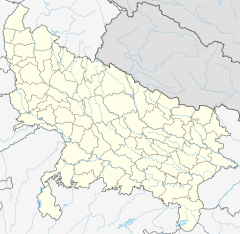Keshav Dev Temple
| Keshav Dev Temple | |
|---|---|
 |
|
|
Location in Uttar Pradesh
|
|
| Geography | |
| Coordinates | 27°30′17″N 77°40′11″E / 27.504748°N 77.669754°ECoordinates: 27°30′17″N 77°40′11″E / 27.504748°N 77.669754°E |
| State | Uttar Pradesh |
| Locale | Mathura |
| Culture | |
| Sanctum | Krishna |
Krishna Janmasthan or Keshav Dev Temple, is a temple in Mathura, India. It is among the most sacred of Hindu sites, and is revered as the birthplace of Lord Krishna. The Keshav Dev Temple is a Hindu temple situated beside the main Krishnajanmabhoomi complex, the birthplace of Krishna in Mathura, India.Kehsav Dev (Krishna) is the deity of this temple. According to traditions, the original deity was installed by Bajranabh, who was great-grandson of Krishna.
After the 1992 Ayodhya events, when security was enhanced at the main Krishnajanmabhoomi complex, the temple has slowly become the de facto Krishna temple for locals and tourists alike. It still carries the local touch and charm of several other temples in the twin towns of Mathura and Vrindaban - which are similar to the older Dwarikadheesh temple in the old town. This temple holds its own festival calendar, and hosts nearly all of the Hindu functions within its own premises independently. The adjacent residential areas of Mallapura, Govind Nagar, and JagannathPuri are the main feeder for many of the festivals. It holds its own "Lathmar Holi", "Chhappan Bhog", and "Krishna Janmashtami" among other festivals. Most of the festivals here follow the calendar of the temples of Goverdhan, rather than that of the main Krishnajanmabhoomi complex.
The temple was built in Mathura, Uttar Pradesh over a prison, believed to be the birthplace of Lord Krishna. In contemporary memory, it was built by Raja Vir Sinh Bundela of Orchaa, in the reign of Jahangir. The Rajput prince enjoyed a special favour with the Mughal on account of his support to Jahangir in his succession.
The site has been a deeply religious one for the Hindus. It is said that the first temple here was constructed almost 5,000 years ago by Vajranabha, the great-grandson of Lord Krishna. The next big temple was constructed here during the time of the Gupta Emperor Chandragupta II, around 400 AD. This temple was so grand that it was said that neither painting nor description could describe it.
...
Wikipedia

